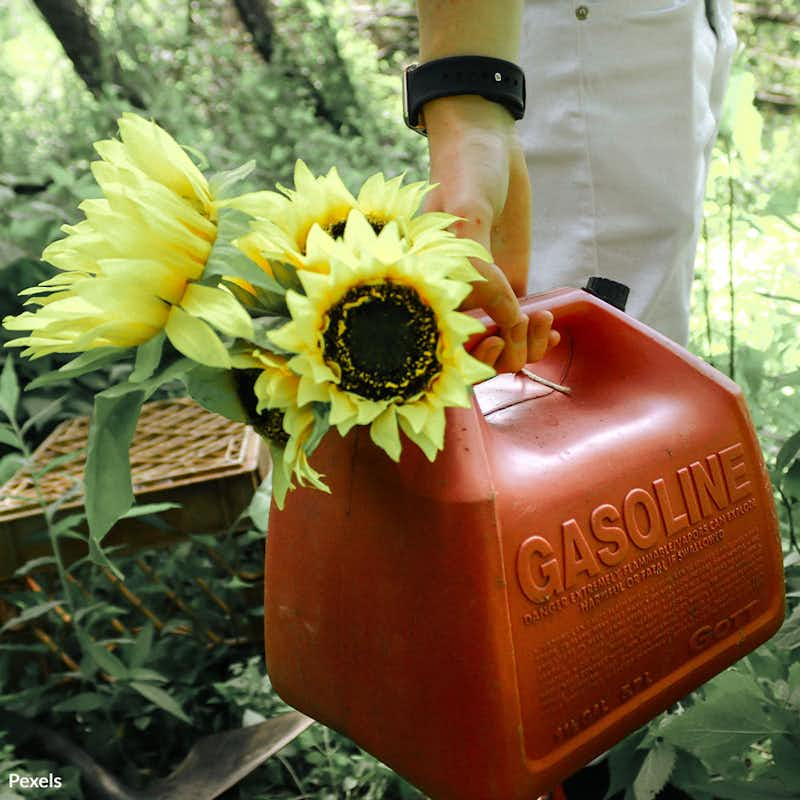Responsible Pest Control for a Safer Environment
5,814 signatures toward our 30,000 Goal
Sponsor: The Rainforest Site
Gasoline is not safe for pest control! Take the pest-free pledge and promote responsible actions for a healthier future!

In today's digital age, viral trends can spread like wildfire, capturing the attention of millions. Unfortunately, not all trends are harmless. Recently, a dangerous insect extermination hack known as the "gas in a glass" method has gained traction on TikTok1. This alarming trend involves using gasoline to eliminate wasps, with users sealing a glass, jar, or bucket filled with gasoline against the nest. The toxic fumes quickly incapacitate the wasps, causing them to fall into the liquid. While some individuals claim success with this method, experts strongly caution against it due to significant safety concerns and potential legal consequences1.
Orkin, a leading pest control company, unequivocally discourages the use of gasoline for wasp extermination2. Ben Hottel, a renowned entomologist and the technical services manager for the company emphasizes that registered products meeting safety standards are the recommended choice for pest control professionals according to guidelines set by the Environmental Protection Agency (EPA)2. Gasoline, on the other hand, is neither registered nor suitable for insect extermination, and its use for such purposes is considered illegal.
Safety Concerns and Environmental Impact
Handling gasoline in the manner prescribed by the "gas in a glass" method poses significant risks, especially during the Fourth of July and the summer season when fireworks are prevalent. Moreover, gasoline is classified as hazardous household waste3. Disposing of containers filled with gasoline and wasps presents an environmental challenge that must be addressed responsibly. Dumping this hazardous waste onto lawns or down drains is not a responsible solution2. Appropriate disposal methods are necessary, begging the question how individuals participating in this trend will manage the resulting environmental consequences4.
Improper disposal of gasoline by pouring it down drains or onto lawns can have severe environmental repercussions. Gasoline contains toxic substances, harmful chemicals, and pollutants that can contaminate water sources and harm aquatic ecosystems when poured down drains. Furthermore, gasoline is not biodegradable and can persist in the environment for an extended period, endangering plants, animals, and microorganisms5.
When gasoline is recklessly dumped onto lawns, it seeps into the soil, leading to groundwater contamination. This contamination becomes alarming considering that groundwater serves as a vital source of drinking water for many communities6. The chemicals present in gasoline can infiltrate the soil, disturbing the natural balance of ecosystems and causing adverse effects on plant health, including reduced growth and even death7. Additionally, if gasoline reaches surface water bodies through runoff, it can harm aquatic life and disrupt the delicate balance of aquatic ecosystems.
Taking Responsible Actions
As the dangerous TikTok trend of using gasoline to kill wasps continues to gain popularity, it is our collective responsibility to raise awareness about the risks and consequences associated with such practices. Safety should always be a priority, and it is crucial to adopt responsible actions to protect our environment.
Together, we can ensure a safer and more sustainable approach to address pest issues while safeguarding the well-being of our surroundings. Let us stand united and take the pledge for pest-free living, committing to the use of environmentally responsible methods of pest control.
- Nadgeena Jerome, The U.S. Sun (14 July 2023), "FLY FEELS I tried the gasoline trick to get rid of a wasp nest on my porch – it killed them all almost instantly."
- Angelica Stabile, Fox News (16 July 2023), "Killing wasps with gasoline: Bug expert discourages ‘dangerous’ TikTok trend, 'would not recommend’."
- Utility Smarts (2023), "Is Gasoline Considered A Hazardous Material?."
- Beth Skwarecki, Lifehacker (26 May 2021), "How to Safely Dispose of Old Gasoline."
- MLI Environmental (2023), "Negative Effects of Pouring Chemicals Down the Drain."
- Groundwater Foundation (2022), "Groundwater Contamination."
- lhwang, American Geophysical Union (17 December 2015), "Tiny fuel spills at gas stations can contaminate soil."
The Pledge:
I pledge to adopt environmentally responsible methods of pest control to ensure the well-being of our planet and protect the delicate balance of ecosystems. By taking this pledge, I recognize the dangers associated with using gasoline for pest control and commit to making a positive impact on the environment.
To ensure environmentally responsible pest control, I pledge to:
- Educate Myself: I pledge to invest time in learning about environmentally friendly pest control methods and their benefits.
- Natural Repellents: I pledge to use natural repellents, such as essential oils, to deter pests from entering living spaces.
- Biological Control: I pledge to encourage natural predators and beneficial insects to control pest populations in gardens and outdoor areas.
- Organic Solutions: I will opt for organic pest control products that are safe for the environment and human health.
- Proper Waste Management**: I will dispose of pest-infested materials responsibly, following local regulations and guidelines.
- Seal Entry Points: I pledge to seal cracks, gaps, and openings to prevent pests from entering buildings.
- Habitat Modification: I will make necessary modifications to reduce pest habitats and attract natural predators.
- Mechanical Traps: I pledge to use mechanical traps and barriers to capture and remove pests without the use of harmful chemicals.
- Responsible Extermination: If professional help is required, I will hire licensed pest control experts who prioritize environmentally friendly methods.
- Educate Others: I pledge to spread awareness about the importance of environmentally responsible pest control practices among family, friends, and community members.
By taking these actions, we can ensure a healthier future for all. Our commitment to environmentally responsible pest control will protect biodiversity, preserve ecosystems, safeguard water sources, and create a safer environment for humans and wildlife alike. Together, let us make a difference and pave the way for a sustainable and pest-free world.
Pledged by,